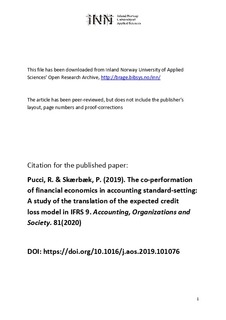The co-performation of financial economics in accounting standard-setting: A study of the translation of the expected credit loss model in IFRS 9
Journal article, Peer reviewed
Accepted version

Åpne
Permanent lenke
http://hdl.handle.net/11250/2646739Utgivelsesdato
2019Metadata
Vis full innførselSamlinger
- NTNU Handelshøyskolen [1706]
- Publikasjoner fra CRIStin - NTNU [38679]
Sammendrag
This paper adds to the literature on the role of financial economics in accounting standard-setting by analyzing the co-performation of an economic theory – the Efficient Market Hypothesis (EMH) – in the construction of a new approach to accounting for credit losses in financial reporting. Inspired by actor-network theory and its notions of performativity and translation, the paper draws on interview data and documents to reconstruct the process by which the devalued “incurred loss” impairment model was replaced with a more forward-looking “expected loss” approach under IFRS in response to the 2008 financial crisis. These actions comprised of a series of experiments and negotiations, including an unsuccessful effort to establish an “ideal”-type model and the failure of a joint initiative between the IASB and the FASB. Alongside extensive considerations over how to make the approach operational, the influence of the EMH regarding the relationship between loan pricing and initial expectations of credit losses is elucidated. We show how a standard-setting objective grounded in financial economics is translated through a process of approximation as it forges linkages with other matters of concern. This process sheds light on the transformations involved in finding tolerable solutions when utilizing financial economics in the setting of accounting standards.
